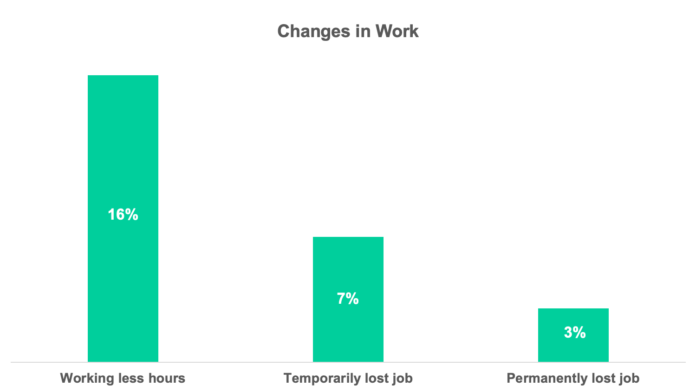Brief • 3 min Read

Many Americans have gone from a desk or cubicle at work to working from home during the COVID-19 pandemic. Unsurprisingly, this has brought many new challenges for those use to being in an office environment. It also has changed work habits for many, and many are wondering if this will have a lasting impact.
One major change has been the hours people have been working. 16% of Americans are working less hours, while 7% have temporarily lost their job or 3% have permanently lost their job. Men (18%) are more likely to be working less hours than Women (14%). This less hours gender disparity further increases when we look at our prime earnings age of 35-44 , Men (32%) vs. Women (12%).

Although many may be missing their cubicles by now, only 4% of those who started working from home have begun to return to the office. That being said, only 32% of working Americans say they are never able to work from home.
How do the remainder of Americans feel about working from home now that it has become the status quo for them? Over half (51%) find working from home is much/somewhat better than from their workplace, while 19% find it to be about the same and 30% report that it is much/somewhat worse.
Men (53%) seem to prefer working from home slightly more than women (48%). It is possible this has something to do with the fact that 96% of men between the ages of 35-44 are still working the same job they had before the coronavirus, but that number is only 60% for women. Digging deeper, half of men between the ages of 45-54 (50%) believe working from home is much/somewhat better compared to only 36% of women in that age range. And having a more full household may have an impact, as 32% of married people report that working from home is much/somewhat worse.
With little end in sight for working from home due to COVID-19, time will tell how these changes may last beyond the pandemic to impact the workspace of the future.
Methodology
This survey was fielded online from June 15 – 17, 2020, among a nationally representative sample of 2033 U.S adults.
Subscribe for more Insights
Subscribe to our newsletter for the latest trends in business, politics, culture, and more.
Download the Data
Get the full data tabs for this survey conducted online within the United States by The Harris Poll on behalf of Yahoo Finance between June 15 – 17, 2020, among a nationally representative sample of 2033 U.S adults.
Download
Subscribe for more Insights
Subscribe to our newsletter for the latest trends in business, politics, culture, and more.
Download the Data
Get the full data tabs for this survey conducted online within the United States by The Harris Poll on behalf of Yahoo Finance between June 15 – 17, 2020, among a nationally representative sample of 2033 U.S adults.
DownloadRelated Content







